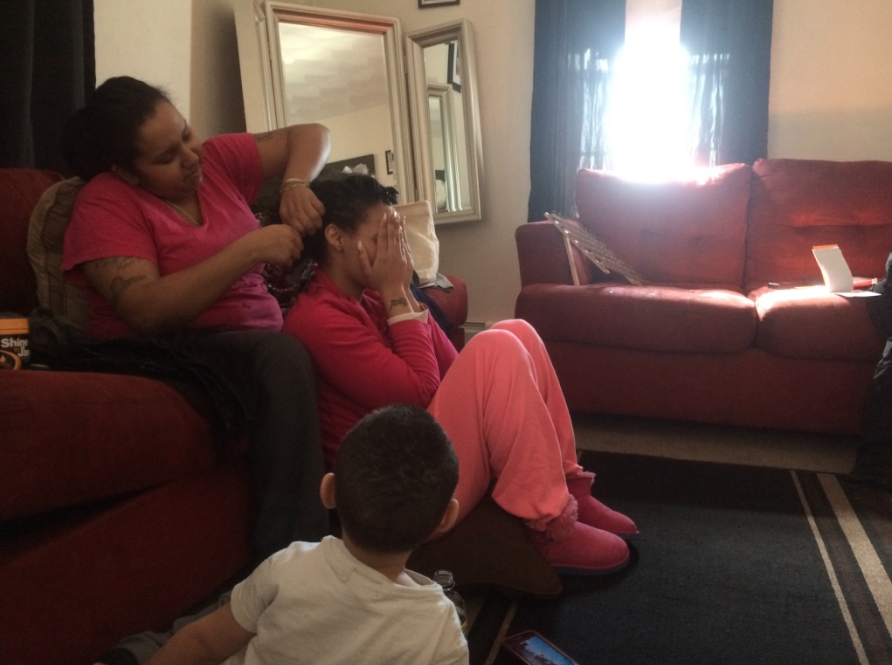RI hair braiders fight for deregulation
Jocelyn DoCouto’s house is home and business in one. She braids her clients’ hair on her living room couch, where client Lily Brown is sitting today. DoCouto will be cutting Brown’s braids from her head this morning and replacing them with new ones. The work can be long,...
Jocelyn DoCouto’s house is home and business in one. She braids her clients’ hair on her living room couch, where client Lily Brown is sitting today. DoCouto will be cutting Brown’s braids from her head this morning and replacing them with new ones. The work can be long, with some processes of braiding and styling taking up to five or six hours. But to Jocelyn it’s worth it. “That’s what my clients tell me. They don’t like doing their do their own hair. They can’t manage their own hair,” she said. “And to them, their hair is my hair, so, I’m the one that takes care of it and they just wear it.”
But DoCouto doesn’t want to keep braiding from her house. She can’t always restrict her client base in the way that she would be able to if she could have her own shop. And the other option, working in someone else’s salon, isn’t really great either, she says. Most braiders essentially rent a chair and are forced to share a good chunk of their proceeds with the salon owner, according to DoCouto.
DoCouto wants to open up her own hair braiding shop, but without a license she isn’t legally allowed to. The Rhode Island Department of Health requires at least 1,500 hours of continuous study and practice in an approved school for a cosmetology license, and this can cost a lot. According to DoCouto, the cost of schooling to get a license in Rhode Island can be up to $12,00. And DoCouto says that this training deals only with traditional hairdressing techniques. This includes cut and color, two areas of practice that involve working with potent chemicals and dyes, which DoCouto doesn’t see as relevant training to what she wants to do in her shop.
“In cosmetology schools there’s no curriculum on protective styling or African hair braiding. It’s mostly cut, color and processing. Those are all chemical-based processes, and that’s nothing that we do,” DoCouto said. “We encourage hair growth, we encourage maintaining your hair’s natural body state versus altering it. Therefore, nothing that we do can, you know, pose any liabilities.”
This often translates to the service that customers like Lily Brown get. Brown says that salons haven’t always known what to do with her coarse, unrelaxed hair. “Come to the wrong lady, wrong person, and she didn’t braid it right, she didn’t braid it tight enough, and she sewed it in,” she said. “My hair was coming out, the braids were coming out while the sew was still in and it was breaking my hair off. So I came in and I told Jocelyn, cut it. Start all over. So now I’m just starting my process again.”
The problem is more systemic than just one bad salon visit. Braiders and customers alike have been dealing with Rhode Island’s strict rules on hair braiding regulation for decades, but it’s just now that legal moves are being made. And DoCouto is one of the people in the fight. Last year she came across the non-profit libertarian law firm Institute for Justice, which is funded by the Koch brothers and based in Washington DC. The firm helped usher in reforms in six states and in the District of Columbia before it turned to Rhode Island. Hair-braiding deregulation is an effort that, according to Christina Walsh, the Director of Activism and Coalitions at the Institute for Justice, has been long-fought since the organization’s founding in 1991. “It’s a time-tested, safe practice. It is absolutely not cosmetology and has no business being regulated as cosmetology,” said Walsh.
DoCouto called the Institute for Justice and they offered to support her case. They crafted House Bill 5436, which would exempt natural hair braiders from the requirement to be licensed as hairdressers or cosmeticians in Rhode Island. The bill got a hearing last year, when Representative Anastasia Williams became a co-sponsor.
“Bills that are somewhat educational controversial, ethnic, I sometimes like to spearhead or sponsor myself because I find that often, non-people of color sympathize and they sign on not because they are in the battle with you, but because they’re sympathizing for you,” Williams said.
Williams has had to deal with issues like these continually during her time in the Rhode Island House of Representatives, where she is one of nine people of color. She sees the barriers that hair braiders in Rhode Island face as an issue that exists because people don’t understand the practice itself.
There is opposition to the possibility of this legislation. Beauty schools are generally not eager to see customers go. But for Jocelyn DoCouto, braiding is something that is taught throughout a lifetime. It’s not as simple as going to school and being approved by a licensing board. “This is something that’s taught through generations where it was consistently practiced day by day,” she said.

